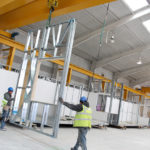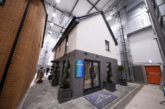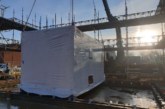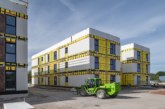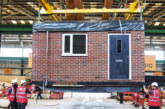Despite recent reports suggesting government departments are not adopting a presumption in favour of offsite, the Modular and Portable Building Association (MPBA) has research which shows volumetric modular construction is undergoing a period of considerable growth. MPBA Chief Executive Jackie Maginnis discusses the uptake in modular construction.
As an optimum residential building technique for timber, steel and concrete designs – volumetric modular construction is at the forefront of offsite technology, making up 60-70% of the market. These solutions arguably form a modern method of construction that is experiencing an entirely different growth trend to that of other offsite approaches.
Over 50% of our membership supplied detailed financial information to support the MPBA’s survey report commissioned through the University of Salford. This market intelligence from 2018 – 2019, provides evidence of a turnover in the sector that exceeds £2,956million. This figure excludes the revenue from the major players who have recently entered the volumetric modular arena including banking giant Goldman Sachs, investing £75m into modular housing business, TopHat, as well as Japan’s biggest housebuilder striking a multi-million-pound deal that will see Sekisui House partner with Homes England and Urban Splash. This agreement will also see a £55m investment into Urban Splash but the largest deal by far was revealed by ilke Homes’ involving a £100m agreement with Places for People.
Offsite technology offers benefits that have had a huge positive impact on the construction industry, bringing longstanding traditional practices up to date. The first key shift away from traditional methods is that build processes take place in controlled factory conditions which requires a change of mind-set and approach. Modular and volumetric practices augment the construction industry with a multitude of benefits that span from greener, healthier environments to maximised sustainability, heavily reduced costs and faster build times – crucial in meeting housing targets.
The modular industry has had a remarkable impact on reducing costs while increasing quality and productivity. Having gained considerable momentum over the past few years, advanced modular techniques reduce build times by an impressive 50-60%. The demand for customisation has led the volumetric modular manufacturing industry to develop methods for adaptation during the mass production process to meet individual requirements.
A number of factors are considered to achieve optimal design efficiency. Module connection detailing and quantities, installation and crane costing rates, specific site logistics, all must be taken into account, together with foundations/transfer decks, volumes of materials and other service core requirements.
Each individual material can be selected specifically for its performance characteristics, tailoring every inch of a modular build. Eco-friendly materials are often specified, and waste is recycled for future projects wherever possible. As units are factory manufactured, stringent quality control processes can be undertaken within these well-managed environments. In addition, modular construction enables site work and building processes to be completed simultaneously, reducing labour costs and build times.
Transportation rarely poses issues, as pre-constructed, self-contained units can be shipped to virtually any location. As modules are designed to withstand long-distance transportation and craning onto foundations, they are structurally stronger than most traditionally constructed building materials.
Architectural Creativity
Many contemporary architects are embracing volumetric modular with bespoke designs including striking facades. Construction clients appreciate cutting-edge building techniques, particularly with the short lead times of modular construction. Modular buildings are energy efficient, fully compliant with building regulations and can be tailored to meet individual customer requirements.
Modular approaches are revolutionising the construction industry. While traditional build processes are laced with pitfalls and can be highly disruptive – volumetric modular buildings are easy to plan, budget, and are quick to erect. Modular technology brings a host of benefits to the residential sector, contributing to healthier, safer and more cost-efficient environments.

